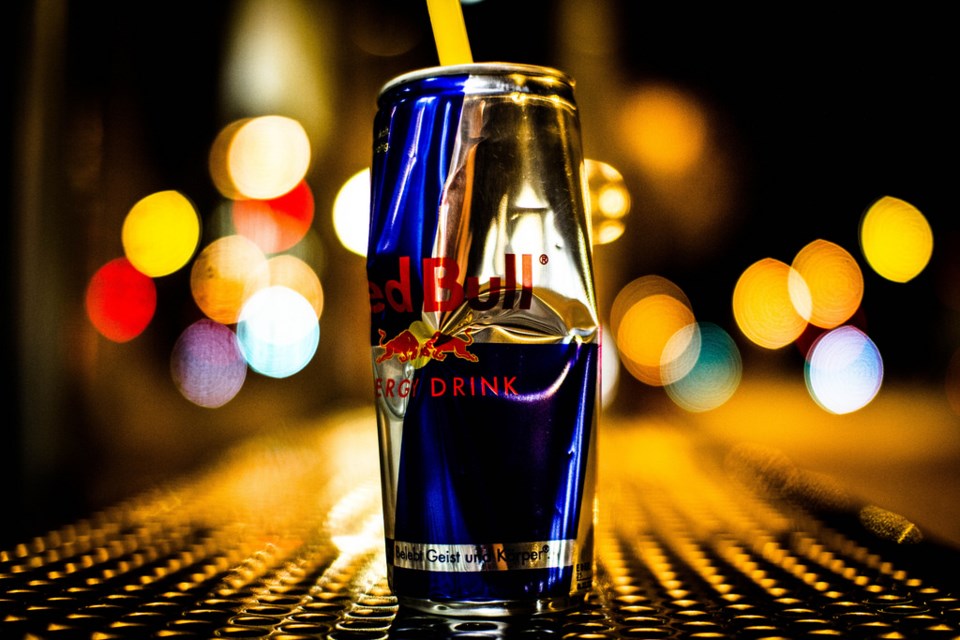Step away from the Red Bull and vodka: Mixing alcohol with highly caffeinated energy drinks might provide a dangerous buzz, putting people at increased risk for injury, according to a study by the University of Victoria’s Centre for Addictions Research of B.C.
The risk of injury could be 20 times greater when people drink alcohol mixed with energy drinks, lead researcher Audra Roemer said Tuesday.
“When we look at alcohol alone, there’s a clear dose-response relationship. When you drink more, the risk goes up,” said Roemer, a clinical psychology doctoral student.
For example, a person who has one or two drinks doubles their risk of injury compared with when they are completely sober, she said. With six drinks, the risk of injury is increased six times.
But when alcohol is mixed with energy drinks, the risk of injury can be 20 times greater, Roemer said.
“It’s quite a bit higher than drinking alcohol on its own,” she said.
She cautions that the findings are based on preliminary analysis of a relatively small sample size.
In the study, Roemer reviewed all the published research on the risk of injury with the use of alcoholic energy drinks.
Ten studies showed evidence of an increased risk of injury from intentional behaviour, such as violence or attempted suicide, or accidental acts such as tripping or being in a car crash, compared with drinking alcohol alone.
“The stimulant effects of caffeine mask the sedative effects of alcohol,” she said.
“Usually, when you’re drinking alcohol, you eventually get tired and you go home. Energy drinks mask that, so people may underestimate how intoxicated they are, end up staying out later, consume more alcohol and engage in risky behaviour and more hazardous drinking practices.”
More research is needed to determine the exact extent of the increased risk of injury when alcohol is consumed with energy drinks, she said.
It has been estimated that the number of visits to emergency departments involving energy drinks nearly doubled between 2007 and 2011. Health Canada asked for more research on the subject in the wake of several deaths involving alcoholic energy drinks.
Increased knowledge and understanding of the relationship between alcohol mixed with energy drinks and injury could be crucial in informing the public and public health policy, the study concludes.
“Although some policies have already been put in place to limit the sale and availability of these beverages, further understanding of the related risks could facilitate the development of intervention and prevention practices,” it says.
Roemer has just completed a two-year study, collecting data from 4,300 patients who visited the emergency rooms at Royal Jubilee Hospital, Victoria General and St. Paul’s Hospital in Vancouver.
“From 2013 to 2015, we had researchers working around the clock, seven days a week, collecting information on people coming into the emergency room to be treated for injury or illnesses or other medical conditions. We asked everyone who came in about alcohol use, energy drink use and substance use,” she said.
“We’re going to be analyzing the data over the next couple of months so now we can see how injuries are related to alcohol use and alcohol-energy drink use. I’m pretty sure it’s going to show there’s an increased risk of injury.”
In the meantime, Roemer thinks it’s important people be informed of the risk.
“There are risks following alcohol, and there are risks following energy drinks, and it looks like there is even more risk following the combined use of both of those,” she said.
“So given how available these beverages are, I think it’s important for people to be aware of the risks they’re taking if they decide to consume these types of beverages.”
The heaviest consumers of alcohol and energy drinks are those ages 18 to 25.
“They want to stay awake longer, to stay up later and party longer,” Roemer said.
The study is published in the March issue of the Journal of Studies on Alcohol and Drugs.



